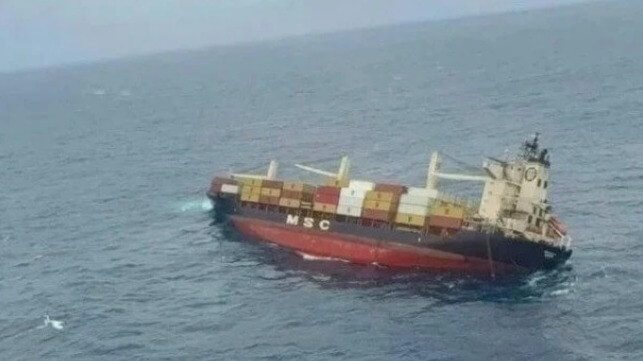Indian Court Detains More MSC Ships as MSC Elsa 3 Claims Grow

The legal woes for MSC Mediterranean Shipping Company are continuing in India, with the Kerala High Court continuing to side with plaintiffs and attach MSC vessels as collateral for the growing number of claims. Twice this week, the court has ordered ships detained at the Vizhinjam Port pending a bond from MSC.
Thursday, August 14, was the latest court hearing after six separate admiralty claims were filed. According to the court papers, the suits allege that fishing nets, wire ropes, and other fishing material became entangled with debris from the MSC Elsa 3, which went down on May 25. The court issued an interim order to detain the MSC Makoto II at the port pending a bond. At 23,722 dwt, it is a smaller vessel of the fleet registered in Panama with a capacity of 1,740 TEU, but it still interrupts operations. As of Friday night, August 15, the vessel was still docked in India.
Earlier in the week, four Indian fishermen simultaneously filed claims with the High Court at the beginning of the week for damages incurred to their fishing vessels. According to the individual claims filed with the court, the four individuals said their vessels had been damaged by debris floating below the surface after the MSC Elsa 3 went down. They also said that debris had become entangled in their fishing nets, causing severe damage. They also included claims for lost metal chains, ropes, and other fishing gear.
The filings were timed to the visit of the Liberian-registered MSC Palermo (199,999 dwt) to the Vizhinjam port. They demanded the arrest of the vessel, which is one of MSC’s newest containerships built in 2024, until their claims could be heard by the court. The 15,576 TEU vessel was making a port call in India on a route from the Far East heading for Portugal.
The High Court found for the plaintiffs and ordered the detention of the MSC vessel at the port on August 12. The company’s representatives were able to post a bond against the claims. The vessel was released and resumed its voyage on August 13.
These, however, were the fourth and fifth times that the court had detained an MSC vessel due to claims. In June, the MSC Polo II was briefly detained for a claim by the Cashew Board, and four days later, the MSC Manasa F was also detained. Both times, the company was able to post bonds for the release of the ships.
MSC Akiteta II, however, has not been as lucky, as she was detained in relation to the $1 billion claim filed by the state. MSC has not posted a bond to release the ship, which was originally detained on July 8. The ship remains at the Vizhinjam port with little prospect of being released in the short term.
MSC’s lawyers filed to limit the claims from the case and asked the court to combine all the claims into a single case, reserving a space for any future claims. The company has also disputed the scope of the claims by the government for its costs in the remediation efforts and the impact on the environment. Based on the value of the vessel, they asked the court to cap the liability at $14 million.
Last week, however, the Directorate General of Shipping (DSG) reported that yet another container had been located, this time floating in the ocean. Salvage teams were able to recover it and reported that it was empty. Previous reports have said that at least 60 containers were retrieved from coastal waters or washed ashore. Large volumes of nurdles have also been recovered from the beaches along with various other debris.
Salvage operations are moving into a critical phase, the Directorate General reported. After capping the fuel tanks, which had been weeping small quantities of oil, a new salvage team will begin saturation diving to tap and pump the fuel tanks. The DSG reported that at the end of last week, ROV certification was underway after the efforts had been delayed by bad weather.
MSC’s court filings have said that due to the nature of the incident, it was unclear how many claims might be filed. It is part of the lawyers’ reasoning for combining the claims to stop the slow drip of continuing case filings. In addition to the claims in India, Sri Lanka is also seeking compensation, reporting debris has traveled approximately 500 miles reaching its coastline.
